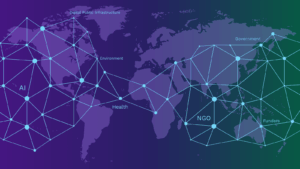Since 2016, November 25th marks the International Day for the Elimination of Violence against Women and Girls. The 2022 UN’s campaign around this day is the UNiTE campaign, which calls on “governments, civil society, women’s organizations, young people, the private sector, the media, and the entire UN system to join forces in addressing the global pandemic of violence against women and girls.” In this blog I take a look at why addressing cyberviolence against women and girls and adopting a gender lens for data policy is crucial for a diverse and inclusive Datasphere – the complex system encompassing all types of data and their dynamic interactions with human groups and norms.
It is urgent to approach the Datasphere from a gender perspective and incorporate a holistic approach that does not only target bias in data and data gaps but also fights against the ongoing violence within data and digital spaces that particularly affect women and girls.
The UN defined “violence against women” in Article 1 of the Declaration on the Elimination of Violence Against Women as “any act of gender-based violence that results in, or is likely to result in, physical, sexual or psychological harm or suffering to women, including threats of such acts, coercion or arbitrary deprivation of liberty, whether occurring in public or in private life.”
Cyberviolence is one form of violence against women and girls that has risen in the past decades and is still today underreported and underrepresented. Abuses against girls and women in the digital sphere stop the full realization of gender equality and perpetuate violations of human rights such as freedom of expression, dignity, and life.
As our societies become more digitized, technological tools and data flows have opened up the space for new voices to engage. Women groups and communities have highly benefited from these tools. However, they are also significantly vulnerable and affected by them. UNESCO data suggests that in 2015 73% of women had already been exposed to or had experienced some form of online violence.¹ These numbers only worsened during and due to the COVID-19 pandemic.²
Power structures and patterns of discrimination deepen with the introduction of new technologies. AI developments are incorporating binary technologies that could be leaving trans and other LGBTI+ communities behind. A woman recently reported being sexually assaulted in the metaverse – where governance is crucial –, which could be unsafe spaces for women and other minorities. It is thus fundamental to incorporate a gender lens into the holistic approach to the Datasphere. By doing so, new evolutions of digital technologies will be diverse, inclusive, and safe for all.
“We need a multipronged approach, both proactive and reactive, that is inclusive of all relevant actors, including privately-owned social and digital media, to eliminate violence against women and girls in digital contexts is required.”
Assistant Secretary-General for Human Rights (15 March 2022)
These are some examples of organizations fighting cyberviolence against women and girls, and working towards including a gender lens in data policy:
- [Europe] European Institute for Gender Equality (EIGE): To better understand the nature and prevalence of cyber VAWG, “EIGE has recently conducted desk research that aimed to define certain harmful forms of cyber VAWG, identify and analyze existing research and gaps in research, assess the availability of survey and administrative data on the phenomenon, and identify relevant good practices in EU Member States.”
- [Europe] Organization for Security and Co-operation in Europe (OSCE): the OSCE leads the “Safety of Female Journalists Online” project, which aims to protect plurality and female journalists online. They lead advocacy efforts and have developed a series of research resources on trauma, counter-responses/newsroom practices, organizations/helplines, digital safety, advocacy, and others.
- [Europe] The Council of Europe: The Council of Europe’s initiative “Sexism: See it. Name it. Stop it” seeks to fight against sexism at all levels. They have a specific section devoted to media and technologies and the harms that can come for women, girls, and other minorities in the digital sphere.
- [MENA Region] EuroMed Rights: By developing a comprehensive study in nine countries of the region (Turkey, Morocco, Algeria, Tunisia, Egypt, Lebanon, Palestine, Jordan, and Syria), EuroMed Rights explored the risks for gender equality in the digital space, online gender-based violence during the COVID-19 pandemic as well as online violence against LGBTIQ+ people in the MENA region.
- [Global] Broadband Commission for Digital Development – Working Group on Broadband and Gender (hosted by the ITU and the UNESCO): In 2015, the Working Group published its report “Cyber Violence Against Women and Girls: A World-Wide Wake-Up Call”, which explores the topic, its global relevance and prevalence, and the ways in which cyber VAWG can be tackled globally.
- [Canada] Actua Canada: In 2020, Actua – one of Canada’s largest STEM organizations is working on a project that empowers young women and girls to assess online interactions to reduce cyber violence.
- [Colombia] Dominemos la Tecnología: This initiative and organization seek to empower women with the tools to know and exercise their rights in the digital sphere. They have a series of tools and partnerships to support minorities, especially women and girls when reporting abuses and to create communities around technologies.
- [India] Queensland University of Technology: Researchers in Australia developed a qualitative study with women who had survived online abuses and harassment. In a research paper, they seek to understand cyber violence in India and the ways in which policymakers could tackle this issue.
- [South Africa] Wireless Application Service Providers Association (WASPA): The WASPA developed a series of interviews with Ilonka Badenhortst, Managing Executive, to raise awareness around gender-based violence going digital. The interviews sought to spark conversation around cyberviolence as a rising issue in South Africa, and how women and girls are being particularly affected.
- [Malawi] University of Livingstonia: The study “Survey of Cyber Violence Against Women in Malawi” sought to understand the prevalence of cyber violence against women in the Karonga district of Malawi. It ventured into the motivations of the perpetrators and the means they used to abuse their victims and similarly studied the coping mechanisms women had to provide insights for policymakers.
Aware of other organizations and initiatives?
Please reach out to us at [email protected] for any suggestions or feedback on this blog.
More blogs on gender and the Datasphere
- Breaking gender bias for a more diverse and equitable Datasphere
- Feminist perspective – lessons for the Datasphere
¹Broadband Commission for Digital Development – Working Group on Broadband and Gender (2015). Cyber Violence Against Women and Girls: A World-Wide Wake-Up Call. International Telecommunication Union (ITU) and United Nations Educational, Scientific and Cultural Organization (UNESCO). https://en.unesco.org/sites/default/files/genderreport2015final.pdf
²UN Women. (2020). Infographic: The Shadow Pandemic – Violence Against Women and Girls and COVID-19. https://www.unwomen.org/en/digital-library/multimedia/2020/4/infographic-covid19-violence-against-women-and-girls




